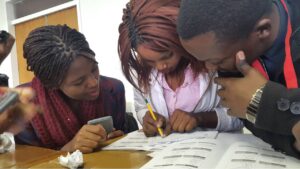Who Is Winning Teams?
We would love to introduce you to who we are, and where we came from
Our Story
Born out of a positive belief in the transformational value of team sport in rejuvenating and empowering individuals, teams, society, and nations, Winning Teams has made a uniquely positive contribution to the world of learning and development.
Spanning nearly three decades, our work has reached hundreds of thousands of teams, workers, learners, students, and communities. Our innovative, flexible, and inquisitive approach has captured the hearts and minds of people who believe in the power of human development.
Belief and Imagination
Our story began as an idea and a belief in a better future for South Africa, inspired by the remarkable period of reconciliation in South Africa during the early 1990’s. The spirit of national unity in one of the world’s most bitterly divided nations, was South Africa’s unexpected win in the Rugby World Cup in 1995. Nelson Mandela’s masterful influence fostered a shared national pride.
“Sport had succeeded in being a unifying force in a deeply divided country.”
The initial product offering which grew out of this period of optimism was deceptively simple. It was based on the idea that teams of people competing against each other in a fun and supportive environment could lead to improvements in morale, facilitate workplace teamwork, engage employees, and raise awareness of critical business performance areas.
Our Founder, Denzil Hollis, designed a familiar board game , with supporting materials and apparel, and worked with our clients to generate questions designed to focus and test knowledge. This approach was non-confrontational, engaging, and most importantly, because it was based on well-understood sporting models, was easy for management to support and implement. Whilst simple, our clients staff loved our product.
We achieved excellent results and positive feedback from our clients, which at the time included De Beers, NBS Bank, Standard Bank, BOE, Sappi, Foschini, African Bank, Heckett MultiServ, SA Eagle, and SAB Miller. Many of these early adopters have continued to support us over the last 20 years, and still remain loyal to our core offering and belief in the underlying philosophy.
This relatively simple approach has proved effective over decades notwithstanding the developments in online learning – the costs are extremely low, and it is relatively easy to implement where basic resources such as power and internet connectivity are limited. MOre importantly, learner engagement is very high.
Performance and Scalability
Following our initial successes at our clients’ branch levels and divisional levels, they raised two issues with us, which would lead us to further major product development.
The first issue that they raised was that surprisingly their staff knowledge levels had improved beyond their expectations, and the results were far superior to traditional training programmes. They saw that our emerging methodology had the potential to reach very large numbers of their staff, and upskill them in an extremely cost-effective way. So our first real client challenge was, how to scale to thousands or tens of thousands of staff, whilst keeping costs well below traditional learning and development programmes. We designed and built sophisticated internet-based systems to implement, manage, and report on performance progress.
Their second challenge to us was to use our system to significantly improve their staff knowledge levels in areas such as customer service, sales, product knowledge, systems knowledge, and essential compliance where training materials, product documentation, and compliance materials were frequently outdated and incomplete or at worst irrelevant. We worked closely with our clients’ product houses, learning and development departments, sales and marketing departments, and executive staff to develop learning and development materials to support performance improvement.
We achieved some notable results during this period including:
- Scale of operations: – Two very large retail and business banking clients were able to rollout our methodology to approximately 3,500 staff members within a two-month period
- Increased sales: – a retail banking client improved sales of one product line by 400% in six weeks
- Faster time to market: – a retail banking client was able to reduce time to market by four months
- Improved productivity: – a vehicle finance company was able to reduce vehicle application processing time by over 200%
- Corporate recognition: – we received personal recognition from a number of corporate executives and CEO’s of large banking groups, and we were short-listed for a World Mail Award.
Some of our clients at the time included Standard Bank, Nedbank, ABSA, FNB, Virgin Money, Abbey National, Halifax, Zurich Financial Services, PriceWaterhouseCoopers, and the South African Post Office.
World of Work
Following our successes in commerce, we were approached by three large banking groups which we had previously worked with, to develop a financial literacy programme for rollout to all school-leavers in South Africa. As with many countries around the world, the level of financial literacy amongst South Africa’s youth was extremely poor.
Working with international role-players, our large retail banking clients, the various provincial educational departments, and the national education department, we were able to develop a comprehensive financial literacy programme which was rolled out to more than 3,000 secondary schools in South Africa, reaching more than two million learners. This programme was funded by a number of partners over more than a decade.
With many thanks to our funders and partners: Nedbank, Old Mutual, Standard Bank, Mutual and Federal, and the South African Post Office.
Youth Learning and Development
During the development, implementation and rollout of the World of Work Programme, we recognised that whilst we were attempting to help learners improve their financial literacy, and help prepare them for the world of work, there were certain undeniable truths. The world was experiencing a learning crisis. 258 million primary- and secondary-school age children and youth were out of school. Many children who were in school were learning very little: 53 percent of all ten-year-old children in low- and middle-income countries were experiencing learning poverty, meaning that they were unable to read and understand a simple age-appropriate text at age 10. This has a huge impact on youth unemployment which is at an unacceptable level.
We were convinced that we could make a contribution to empowering young people living in the poorest communities to significantly improve their chances of a successful future in the workplace, by equipping them with life-long learning skills. Working with subject matter experts in Mathematics, Science and English, together with educational role-players we decided to pivot our organisation mission to focus on this.
We have had very successful results so far, and we plan to scale this further with the appropriate funders and partners. The results we have achieved are in the following measurement areas:
- Improved retention of learners in secondary schools, reducing the dropout rate
- Improved learning outcomes in secondary schools
- Improved transition rates from secondary to tertiary education, and to the work environment
- Successes in ‘catch-up’ rates from learning gaps
- Improved gender integration
Our partners include the National Department of Higher Education, African Rainbow Minerals, Old Mutual, and the Cambridge Education Institute.
Our Organisation
Winning Ways NPC (2012/110081/08) is a non-profit entity registered in terms of the Companies Act (No 71 of 2008 – Schedule 1 para 1.
The South African Companies Act of 2008 provides for the incorporation of a non-profit company, which is recognized as a separate category of company. The non-profit company can be established with or without members, but it must have at least three directors (Companies Act Section 3(1)). The non-profit company is incorporated with the Companies Commission; it can be incorporated for a public benefit objective, or an objective relating to one or more cultural or social activities or communal or group interests (Companies Act Schedule 1 para 1). The non-profit company is subject to the non-distribution constraint requirement. Non-profit companies have legal personality and therefore offer limited liability to their members and directors. They can enter into contracts and sue and be sued in their own name.
Winning Ways outsources its administration and managed care functions to Winning Teams (Pty) Ltd through a formal contractual arrangement.
Winning Teams
Winning Teams | Athol, Sandton, Gauteng, 2196, South Africa | +27 83 488 9000 | info@wteams.com
Copyright Winning Teams @ | Privacy Policy | Terms and Conditions



